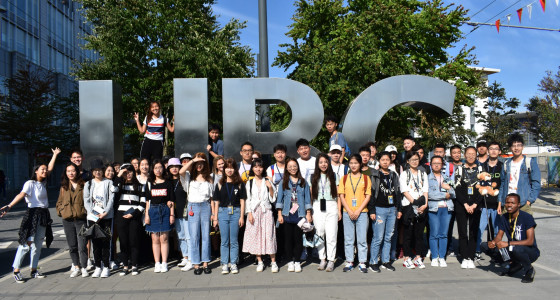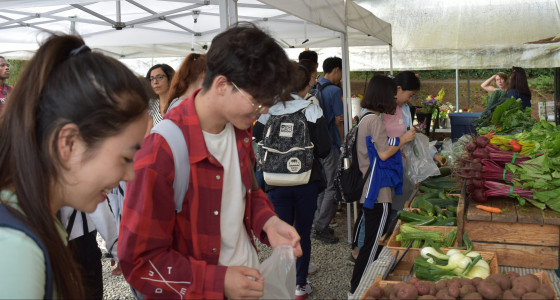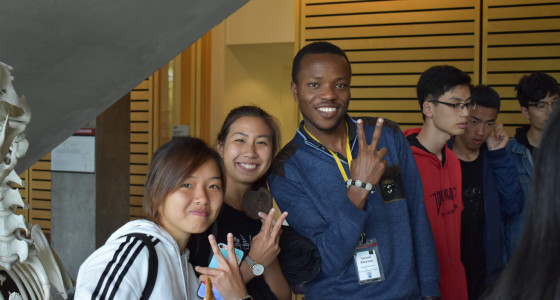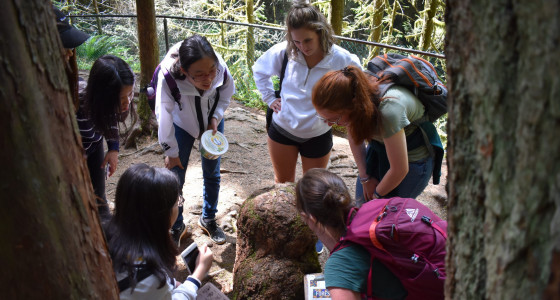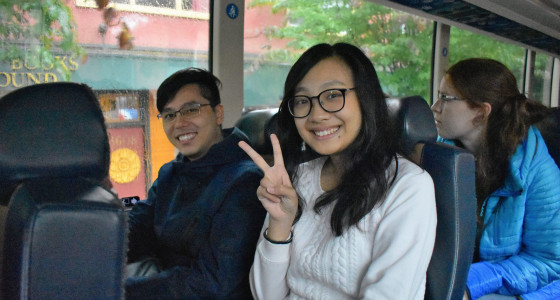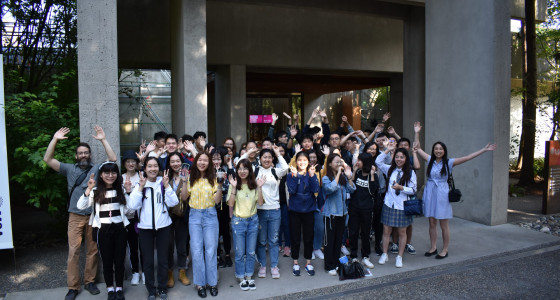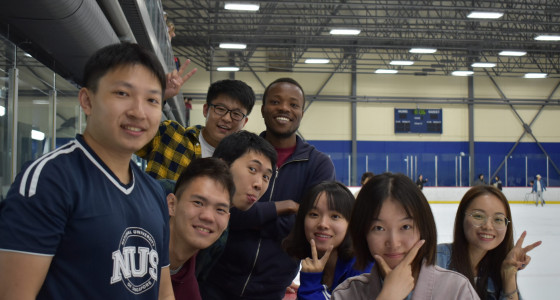
Vancouver Summer Program
The Vancouver Summer Program (VSP) is a four-week academic program for international undergraduate students. The program provides the opportunity to take two academic courses while learning about Canadian practices and culture.
Click here to view the IRES VSP 2024 Program Brochure.
Program Overview
The total cost for joining the Vancouver Summer Program in 2024 is $5,825 CAD and it’s comprised of two parts:
Application fee: $125 CAD, payable upon submitting the application
Program fee: $5,700 CAD, this includes course fees and materials, most activities, accommodation, and medical insurance. The program fee is due by the payment deadlines listed below.
Some VSP course packages include socio-cultural activities that are included in the program fee, while other activities are partly subsidized or come at an additional cost. For example, students may be responsible for the cost of public transportation for all off-campus classes and field trips.
Note: Students are responsible for the cost of food and transportation around the city, as well as any other personal expenses they may incur.
Course Schedules, Hours and Credits
Schedules vary depending on the package selected. Typically, classes are held 5 days a week from Monday to Friday.
Example of a typical schedule:
9:00am – 12:00pm | Morning class
12:00pm – 1:00pm | Lunch break
1:00pm – 4:00pm | Afternoon class
The IRES VSP includes approximately 39 hours of class time per package. Courses are directed by UBC faculty members and taught by researchers in our community. Classes are interactive and may include group discussions, guest lecturers, research projects, and short fieldtrips.
Courses do not received UBC credit but course credit may be granted by the student’s home university (at its discretion).
Note: Many course packages have a minimum and maximum class size, so we encourage you to register your students early. Course packages that do not have the minimum number of students will not be offered, but students may transfer to other packages.
Accommodations
Accommodation and residence details can be found on the UBC Vancouver Summer Program website.
Take a virtual tour of UBC!
Social and Cultural Activities
The IRES VSP includes organized social and cultural activities, which are a great opportunity to make friends with other VSP students from around the world, as well as local UBC students! Additionally, these activities are opportunity to learn more about Vancouver and Canadian culture.
Example activities include:
- Welcome event and Orientation
- UBC campus tour
- Vancouver city tour
- Sports day
- Pizza night
- Board game night
- Museums
- Farewell event
Optional weekend trips to the following locations may also be organized:
*additional fees may be required
[CANCELLED] IRES Package A JUNE | FOOD FOR A HEALTHY AND SUSTAINABLE PLANET
Sustainable Food and Farming Systems
In this course, lectures and assignments will incorporate data science allowing students to understand how experts use quantitative techniques in sustainable farming solutions. Our food and farming systems are one of the greatest causes of global environmental problems. Agriculture is responsible for continued deforestation, biodiversity loss, greenhouse gas emissions, depletion of freshwater resources, and water pollution. You will be given an overview of global agriculture (spatial distribution of crops and livestock, irrigation and fertilizer use), its historical evolution, environmental consequences, socio-economic dimensions (who/where are farmers, land tenure, labour, food sovereignty, right to food, access to food), and some proposed solutions for addressing these challenges. Students will uncover stories on what the data tells us about sustainable intensification, organic farming, agroecology, genetically modified foods, smallholder systems, and supply chains.
Sustainable Diets and Nutrition
This course emphasizes analytic and communications skills that will enable students to participate in contemporary sustainability debates. Nearly 1 in 7 people today remain undernourished, while 2 billion are malnourished. Students interested in public health, global health, medicine and health systems management will learn why a nutritious diet is critical to raising the quality of life of a large section of the world’s population. Students will learn the fundamentals of health education and communication, regarding concepts such as calorie calculation versus nutrition, dietary diversity, macro vs micro nutrients, vegetarian/vegan diets, food safety, and the relationship between diets, human health, and planetary health. Students will also become familiar with systemic strategies and policy issues, such as the role of dietary shifts as a critical pathway toward meeting the United Nations Sustainable Development goals.
[CANCELLED] IRES Package B JUNE | CLIMATE CHANGE AND THE ENERGY TRANSITION
Climate Change: Causes, Consequences and Adaptation
Climate change resulting from the use of fossil fuels in the global energy system is perhaps the single greatest collective challenge facing society in the 21st century. Acting on climate change will dramatically alter the global economy and job creation sectors. As a student you need to be prepared for employment opportunities associated with climate change. In this course, students will learn the science behind human induced climate change, and examine possible consequences and impacts across the world. You will study how experts make predictions of future climate change and its impacts, and how societies will need to re-organize their economies and institutions to adapt to new climate realities. This hands-on course includes field trips and presentations from industry guests, giving students the chance to communicate directly with experts working in the field.
Energy for Sustainable Development
Globally, large-scale innovation in energy systems are needed to reduce greenhouse gas emissions. Technological and business innovations have begun to transform the global energy system. You will learn from experts about the development of renewables such as solar and wind, the deployment of electric vehicles, and the diffusion of new ‘mundane’ technologies like improved cook stoves in the developing world. You will build your ability to communicate with professionals about what is driving these innovations, how might their promise be reached and their benefits be maximized, and what social and policy efforts are needed to sustain them. This hands-on course includes field trips and presentations from both governmental and non-governmental employees, giving students the chance to communicate directly with industry experts.
[CANCELLED] IRES Package A July | FOOD FOR A HEALTHY AND SUSTAINABLE PLANET
Sustainable Food and Farming Systems
In this course, lectures and assignments will incorporate data science allowing students to understand how experts use quantitative techniques in sustainable farming solutions. Our food and farming systems are one of the greatest causes of global environmental problems. Agriculture is responsible for continued deforestation, biodiversity loss, greenhouse gas emissions, depletion of freshwater resources, and water pollution. You will be given an overview of global agriculture (spatial distribution of crops and livestock, irrigation and fertilizer use), its historical evolution, environmental consequences, socio-economic dimensions (who/where are farmers, land tenure, labour, food sovereignty, right to food, access to food), and some proposed solutions for addressing these challenges. Students will uncover stories on what the data tells us about sustainable intensification, organic farming, agroecology, genetically modified foods, smallholder systems, and supply chains.
Sustainable Diets and Nutrition
This course emphasizes analytic and communications skills that will enable students to participate in contemporary sustainability debates. Nearly 1 in 7 people today remain undernourished, while 2 billion are malnourished. Students interested in public health, global health, medicine and health systems management will learn why a nutritious diet is critical to raising the quality of life of a large section of the world’s population. Students will learn the fundamentals of health education and communication, regarding concepts such as calorie calculation versus nutrition, dietary diversity, macro vs micro nutrients, vegetarian/vegan diets, food safety, and the relationship between diets, human health, and planetary health. Students will also become familiar with systemic strategies and policy issues, such as the role of dietary shifts as a critical pathway toward meeting the United Nations Sustainable Development goals.
[CANCELLED] IRES Package B JULY | CLIMATE CHANGE AND THE ENERGY TRANSITION
Climate Change: Causes, Consequences and Adaptation
Climate change resulting from the use of fossil fuels in the global energy system is perhaps the single greatest collective challenge facing society in the 21st century. Acting on climate change will dramatically alter the global economy and job creation sectors. As a student you need to be prepared for employment opportunities associated with climate change. In this course, students will learn the science behind human induced climate change, and examine possible consequences and impacts across the world. You will study how experts make predictions of future climate change and its impacts, and how societies will need to re-organize their economies and institutions to adapt to new climate realities. This hands-on course includes field trips and presentations from industry guests, giving students the chance to communicate directly with experts working in the field.
Energy for Sustainable Development
Globally, large-scale innovation in energy systems are needed to reduce greenhouse gas emissions. Technological and business innovations have begun to transform the global energy system. You will learn from experts about the development of renewables such as solar and wind, the deployment of electric vehicles, and the diffusion of new ‘mundane’ technologies like improved cook stoves in the developing world. You will build your ability to communicate with professionals about what is driving these innovations, how might their promise be reached and their benefits be maximized, and what social and policy efforts are needed to sustain them. This hands-on course includes field trips and presentations from both governmental and non-governmental employees, giving students the chance to communicate directly with industry experts.
Eligibility
General requirements
To apply for the Vancouver Summer Program, you must be an undergraduate student* at a post-secondary institution outside of Canada and at least 18** years of age on the first day of the program.
*We accept applications from undergraduate students who complete their degree between December 2024 and the program start date.
**We have a minimum age requirement of 18 years old.
English language requirements
To qualify for the Vancouver Summer Program, you must be fully proficient in English and be able to engage in an academic setting. Language requirements are self-assessed—we do not require TOEFL or IELTS results.
Please click here to see full eligibility requirements.
Application Deadline and Payment
Program costs
The Vancouver Summer Program package fee of $5450 CAD is all-encompassing and includes tuition for your course package, accommodation, course materials, and medical insurance.
The fee also includes transport to and from the airport, a city tour of Vancouver, a welcome event, and a farewell lunch.
Other included activities differ according to your chosen course package. Some packages include socio-cultural activities, while other activities are partly subsidized or come at an additional cost. For example, students may be responsible for the cost of public transportation for all off-campus classes and field trips.
Payment deadline
To qualify for the 2024 Vancouver Summer program, you must receive your Letter of Acceptance and make payment by the following dates:
June Session: March 1, 2024
July Session: April 5, 2024
Scholarships and bursaries
Unfortunately, the University of British Columbia is unable to provide scholarships or bursaries for the Vancouver Summer Program.
Check with your educational institution or local government to find out if you’re eligible for financial support.
Other Costs
Your airfare, meals, personal trips and personal expenses are not covered in the program fee unless noted otherwise.
For a sample budget, and further information on registration and payment, please see the UBC Vancouver Summer Program website.
Click here to apply! COME BACK IN 2025!
Contact Information
+1-604-827-2957
